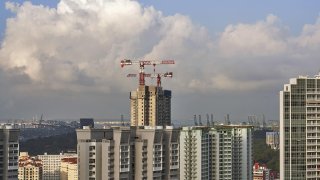
- Supply constraints are driving up property prices and rents in Singapore, the chief executive officer of a real estate company said Friday.
- "You can see a massive gap opening up between demand and supply," said Hari Krishnan of PropertyGuru.
- "Demand has been on a tear and supply has been constrained," he said.
Supply constraints are driving up property prices and rents in Singapore, the chief executive officer of a real estate company said Friday.
"You can see a massive gap opening up between demand and supply," said Hari Krishnan of PropertyGuru.
We're making it easier for you to find stories that matter with our new newsletter — The 4Front. Sign up here and get news that is important for you to your inbox.
Singapore introduced measures to cool the property market in December 2021, but analysts told CNBC in February that they expected prices to continue to rise, though at a slower rate.
Prices of private residential properties increased by 0.7% in the first three months of 2022, compared with the 5% increase in the last quarter of 2021, according to the Urban Redevelopment Authority.
The resale price index for public housing flats increased 2.4% in the first quarter of the year, a smaller rise than the 3.4% growth posted in the last three months of 2021, data from the Housing and Development Board showed.
Money Report
PropertyGuru's Krishnan said Singapore's construction sector was largely shut for around two years because of a lack of manpower, though the industry started to recover in 2021. Supply chain bottlenecks also affected building materials, he said.
"Demand has been on a tear and supply has been constrained," he told CNBC's "Squawk Box Asia."
That's what is driving prices up, he added.
PropertyGuru shares started trading on the New York Stock Exchange in March after a merger with special purpose acquisition company Bridgetown 2, which is backed by billionaires Richard Li and Peter Thiel.
In its first earnings release as a public company last week, it reported a 42% increase in revenue from a year ago, but also a rise in net loss to 120.3 million Singapore dollars ($87.8 million) because of its merger with Bridgetown 2.






